Interview with Siegfried, a member of the Sicherheitspolizei [Security Police] and later the Einsatzgruppen, Landau, 1989.

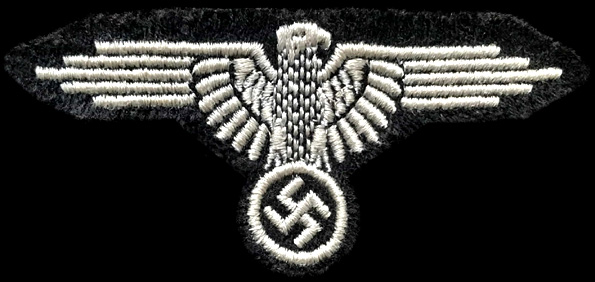

Interview with Siegfried, a member of the Sicherheitspolizei [Security Police] and later the Einsatzgruppen, Landau, 1989.



Siegfried: I started out as a police officer in Königsberg, which is in the former state of Prussia. It is now in the east behind the Iron Curtain. I became a member of the security police [uniformed police force] in 1937 and became fully active by 1938. The German police were under the control of the Reichsführer-SS Himmler and the SS [as of June 17, 1936]. Because I was in the police, when war started many of us were asked to serve in police groups that would be working behind the front line to keep order in occupied areas of Poland. I then became a member of a free SS police unit and went to Warsaw and many other Polish towns in 1939/40. This was an all volunteer force put together to fill the void of rear area security in the armed forces.
Did you have to do any special training when you transferred to the SS?
Siegfried: Yes, since we were already police we had a lot special training in how to handle arrests, angry people, and so forth. When we made the change, we had to attend classes on espionage, sabotage, and resistance. We also had to learn about Polish law, which was now under occupation control. We were told to be kind and humane to the Polish people and that they were not our enemies. Much of their police had been drafted for war and were prisoners, it would take time to sort through them to return them home. We were assigned a district after training, and we had cases given to detectives which had to be worked. It was everything from missing persons, attacks on the German minority, to petty crimes.
My unit was in the Lodz area which was called Litzmannstadt, for awhile working with the Jews who made claims the Poles attacked and killed many of their community. Due to this we arrested several Poles who had ties to nationalist groups. These people hated German and Jew alike, and often used deadly force against innocents. These Poles behaved like a spoiled child that has had a toy taken away. They were so mesmerized by British promises they refused to even think about German demands. They attacked their new citizens almost from the beginning in 1919 [one of many consequences of the Versailles Treaty], making it intolerable by 1939. There was a very big case load of these attacks we had to help investigate. Even former Germans Jews who immigrated after 1933 were attacked by these mobs. We had training in interrogating people, as not everyone told an accurate account, even some Germans could exaggerate the account, and we had to know what questions to ask to trip them up in a lie.
[Above: (left) Polish Blue Police on the streets with German police, 1941. (right) A Blue Police officer checks the papers of a civilian with German police standing by, Krakow. The Blue Police got their name from the color of their uniforms.]
[Above: Two sisters, Katarzyna Koziol and Józefa Chlon, give refreshments to members of the Blue Police, Otfinów, southern Poland, 1942-1943.]
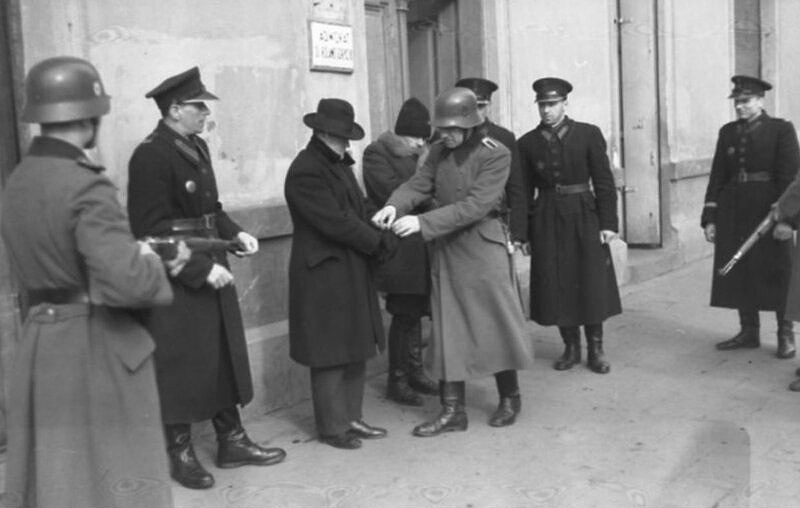
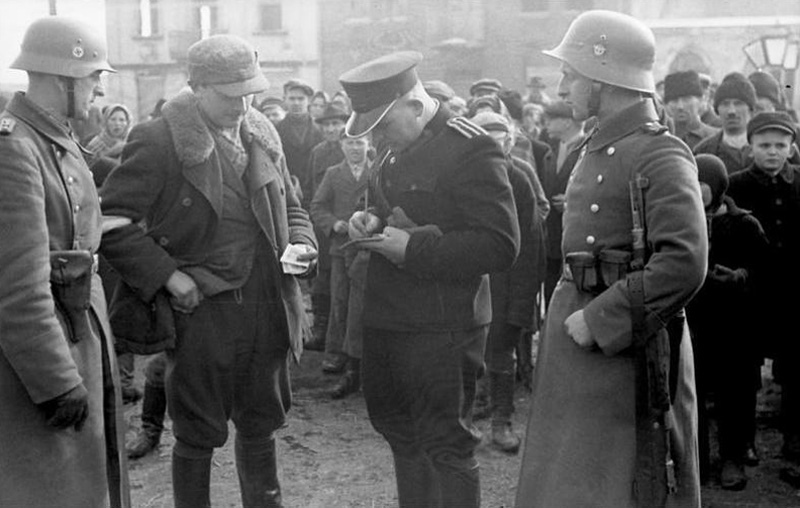
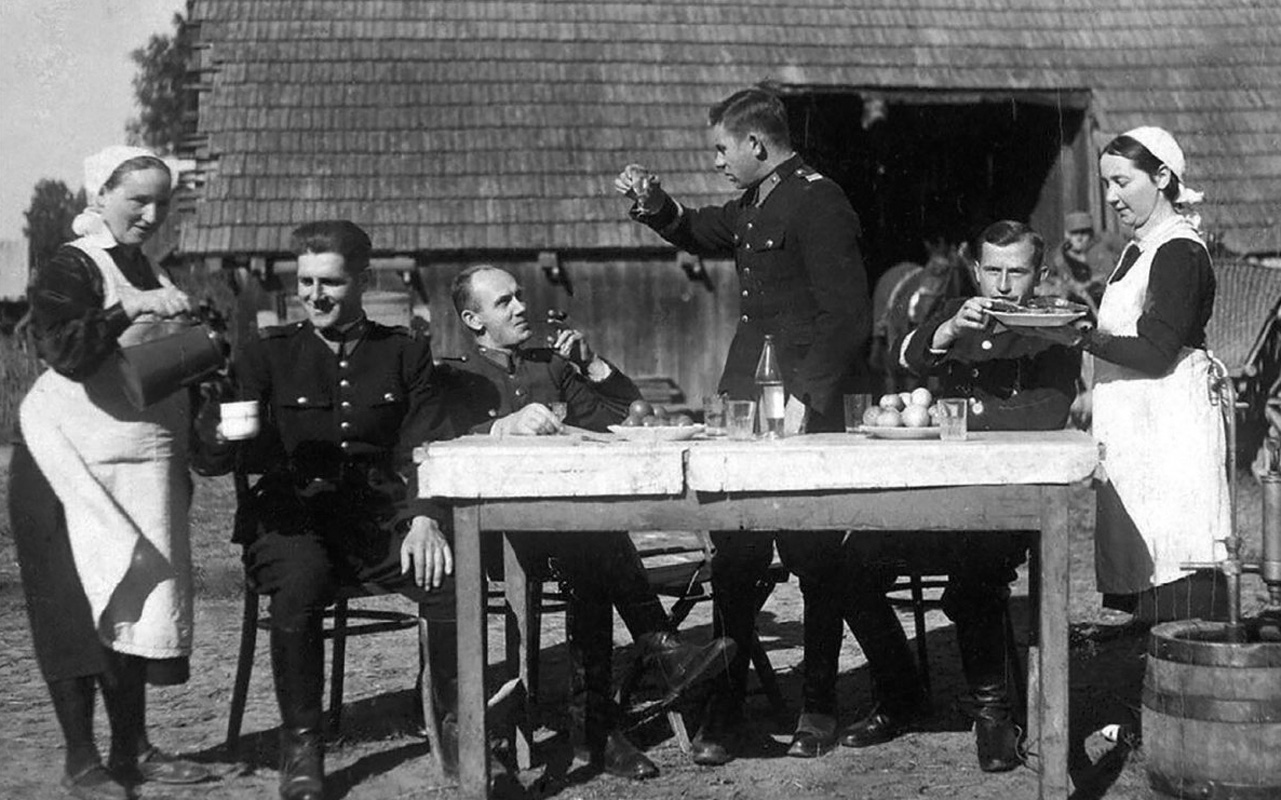
Siegfried: Yes, Germans were killed in Poland; there is no question of that. We had eyewitness testimony, letters, photos, written confessions, and survivor testimony. Many Polish killers were hunted down; some even ran away to Hungary, but were turned over to German authorities for prosecution. Bromberg [also known as 'Bloody Sunday', which took place on the 3rd and 4th of September 1939] is the most famous, but there were Germans all over Poland who testified they were attacked, raped, their homes burned or looted, and threatened. These were very serious charges and the internal police became involved as well as the security police. I do know if a Pole was convicted of killing he was executed right away.
If they did anything else they went away to a camp in many cases. It was important we restored order quickly so there was not much leniency for these criminals. They came from all walks of life. I will say to you even some church people took part in these attacks, or helped hide the attackers. A German family was robbed and the father killed on the 3rd of September, right before army units arrived. The man who shot the father took refuge with a parish. The order went out to not aid him via flyers, announcing the punishment could be death. We found him thanks to a Pole who knew right from wrong. The priest, his staff, and a few of the believers were sent away to camps and the killer was shot after a quick trial. I later learned the priest was sentenced to five years in a camp, but actually was allowed to minister to the prisoners freely. It was not really a harsh sentence which should have carried death.
Now for the Jews, they were much hated in the east, and they also suffered when the attack started. Poles looted homes and some even killed Jews they had had bad dealings with. It was revenge for past injustices it seemed, but still order had to be restored. The Poles were angry at us for aiding the Jews. I remember in 1941 when they demanded a ghetto be erected to keep them separate, so the government allowed it. The Poles asked that Jews be segregated as in Germany, and that was implemented. We restored peace and a very good balance between fairness and order. Some schools were closed due to anti-German activities but once things calmed down by 1941 they were opened back up. Poland's Soviet government today says we denied all access to education. I laugh at that as I saw Polish children go back to school with German donated supplies.
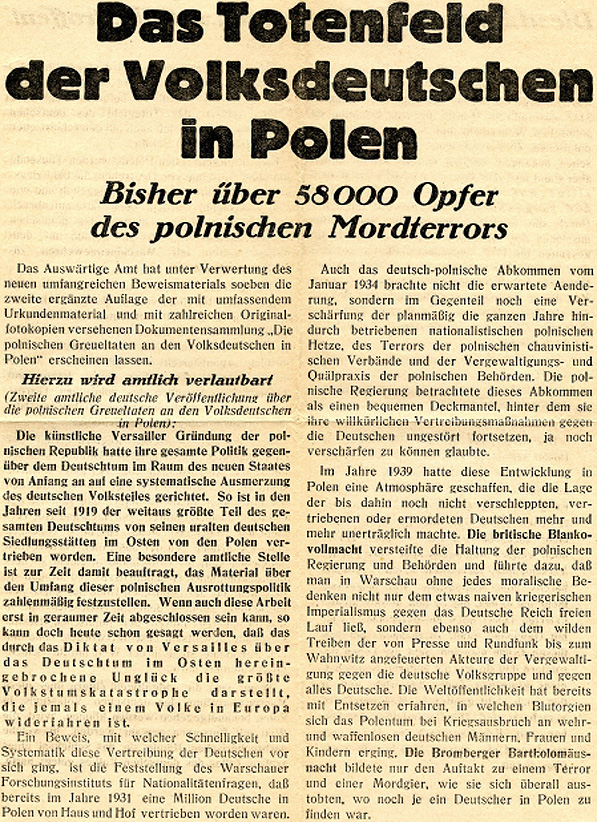
[Above: A period German article stating that over 58,000 Germans were murdered in Poland. The headlines say: 'Das Totenfeld der Volksdeutschen in Polen - Bisher über 58,000 Opfer des polnischen Mordterrors - Die schlimmsten Befürchtungen weit übertroffen' (The field of death of ethnic Germans in Poland - So far, over 58,000 victims of the Polish murder terror - The worst fears far exceeded). Click to read more.]
Did you ever see any police or SS units harm or execute Jews or others?
Siegfied: That is a very odd question, I assume you mean did we round up and kill Jews, as it has been reported? The answer is no, quite frankly and honestly. I was a police officer sworn to uphold the legal laws of my nation. Part of the confusion that comes from talking about this is who we went after. Our job was simply to investigate any claims made against a person, village or group who was accused of crimes. The Jews are problematic, as they are not an innocent people as they are treated today. Their leaders made them our enemies back in 1933 when they pronounced a war on Germany and began a plot to kill our leaders.
It should also be mentioned they ran every illegal operation in Germany like gambling, black marketeering, sex trafficking, child kidnapping, prostitution, money crimes and they operated everything like a mafia. This marked them as enemies of the people; the problem was sorting the good ones from the bad. In some areas in the east where high crime was occurring it was easier to just remove them all to a safe place so they could be isolated and watched. In many cases the local police or militia took control and I am sad to say they killed some without any trial or evidence. I saw this when they arrested Jews in a small village and the militia took them up to a hill and shot them all, men and women. The crime had been a militia member's family was attacked and killed one night while he was away. Someone said they saw the attackers run away to the village.
This is how it was in the east, a tit for tat war that we stepped into. We had to fight against both sides to bring order. If a Jew was innocent and left things alone then they were never bothered. Same for the majority of the Poles, they were kind and had no reason to fear us or hate us. It was the very small groups who get all the attention.
[Above: A mountain of hatred. The war against Germany began long before 1939, it began in 1933 when Adolf Hitler was elected and Germany freed itself from the economic chains of international capital and usury. Here is just a tiny group of hate and insanity, as mentioned in the interview. Click to enlarge.]
Siegfried: That again was not a pleasant time. The action group I was attached to worked mostly in the Ukraine and on the Polish border. When German forces bypassed enemy troop areas we were tasked with clearing them. Most of the time this was very easy as they knew the war was over for them. Later on some groups were organized by Moscow into fighting bands and took the war to the rear area, that is what we were used for. We worked with militias and home armies to quell these attacks, which could be very bloody. These bands did not play by the rules and were nothing more than criminals.
They disrupted food supplies, which in the Ukraine was already bad before the war. The civilians hated them, and flocked to fight them, or at the least inform on them. Moscow understood they could utilize the rear area and sent many regiments in plain clothes to fight. This is very illegal in wartime, and this is why most everyone who were caught doing this were executed. There were some exceptions to this, but the crimes always fit the punishment. I can say that I saw my fair share of innocent people murdered by these bands. They mostly kept away from the large cities as the people hated them and would turn them in. They did their fighting far out in the small hamlets and villages, but close to roads and rails. They would attack trains and convoys and then try to attack those responding.
In our area we saw the results of attacks on farms, small mills, and outposts. Whenever this happened we were loaded into trucks, or deployed like a net, to hunt the bands. Since they blended into the population they could be hard to identify, but since the people hated them they often told us where they saw them run off to. We would go into villages and search, sometime we stumbled on their camps, which resulted in battles. Early on these were simple affairs and the bands were not very well armed or organized. Later on they became much better, but we still defeated them. Many of the bands were Jews who refused to go to the ghettos or who had warrants for their arrest. We sometimes had to clear out Jewish areas and move them, as the state considered them to be enemies due to their lawlessness and criminal activity.
Sometimes Jewish elders would come to us to ask for protection against attacks from the people. It was quite a different story from what people read in the papers today, we did not fight in the same war. What they report on is a make-believe land that never happened. I am sorry that it creates hate against those who were really innocent and only trying to help people. We will stand guiltless in the end.
Did you ever have to fight regular soldiers or were you always behind the lines?
Siegfried: Ah yes, during the summer of 1944, my unit was with Army Group B and were thrown into alarm units to stop the Soviet attack. We were dressed as combat soldiers, with steel helmets and rifles. If you were lucky you had a machine pistol or something special, usually we just had old 98s, or captured rifles. The Soviets broke through the lines and all available men were sent to halt it. The partisans also joined in and attacked along with the Soviets. We were used as 'firemen' to go to areas that were threatened. These attacks were so heavy that the thin German line could not hold and we slowly retreated back into Poland.
We would build makeshift fortifications, only to have the unit next to us overrun and collapse. It was a retreat that lasted until September when we stopped before Warsaw; the Soviets ran out of supplies. My unit was sent behind Warsaw during the fighting to prevent escapes and sabotage.
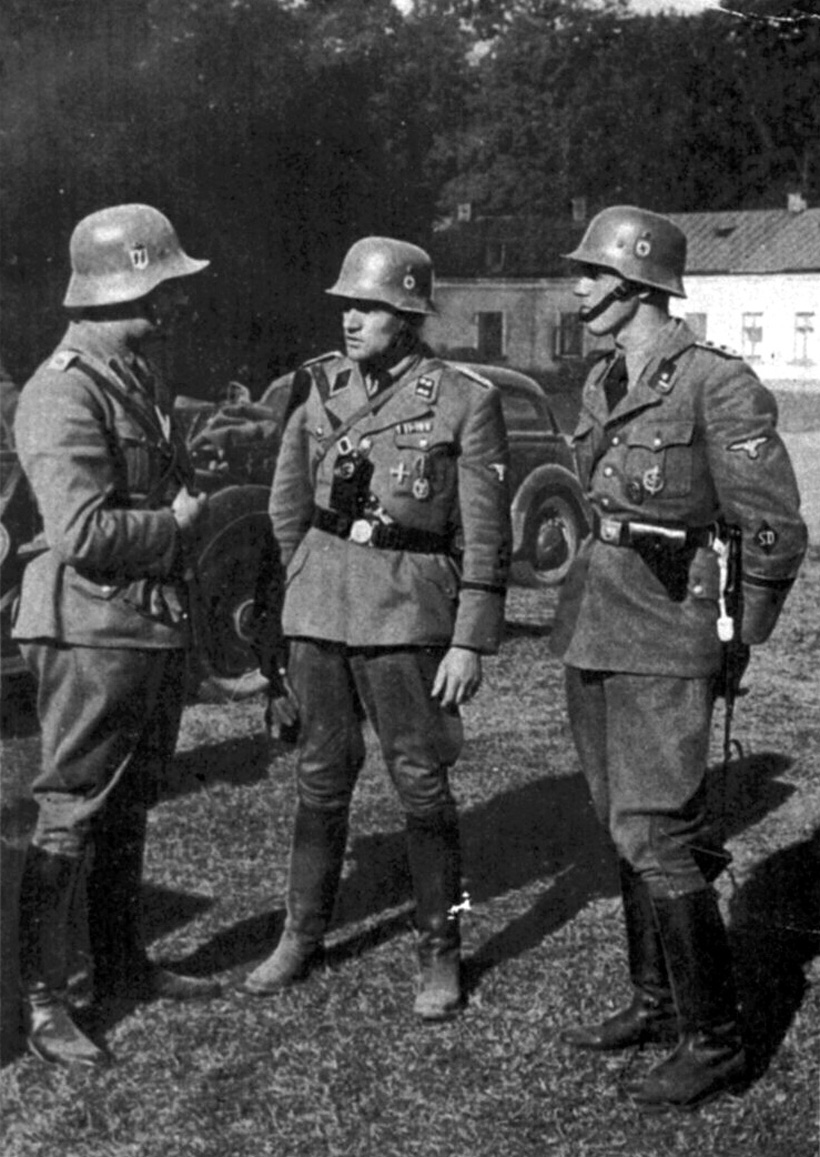
[Above: In better times -- SD/Einsatzgruppe in Poland, 1939.]
Siegfried: I can not say anything good about them; they razed half of Europe supporting an evil idea. Millions died by their hands in a system designed to kill anyone who disagreed with them. I saw several examples of their deeds when a village would be retaken, or eyewitnesses would tell of abuses. They may have indeed been young soldiers like us but their cause was bad and they were taught to show no mercy. Of course there are exceptions but I am telling you my thoughts.
The rapes of German women is a known atrocity that alone condemns them. The Jew [Ilya] Ehrenburg told them to commit any crime or act of terror against our people. There were many from my town that were killed by this animal behavior. Many friends told stories of what they saw, and of who they never heard from again.
Part of my understanding was he [Ilya Ehrenburg] told the soldiers to do this because they were getting revenge on what had been done to the Russian people. You say this is not true?
Siegfried: No it is not, the east front was a bloody war but that could not be helped. The enemy we faced made it that way. This war was a war against Jewish Bolshevism, and they were a very cruel enemy. They won, so they get to tell the history anyway they want it told. Our units had a hard job, yes partisan bands that had many Jews in them were arrested and executed. I did see this and had to participate in executing criminals, it was orders. Shit, even our own propaganda crews filmed it. German army units had to do it, other times it was local militia units. Home militias would get quite angry if we did not execute someone because they were a high value person.
Do not confuse this with guilt. These illegal bandits caused the deaths of soldier and civilian alike, and when caught they paid for their crimes. Any army does this, the Soviets wiped out whole villages for helping their enemies. We saw animals killed by these butchers just to send a message to not aid us. Therefore when we fought them and captured them they were illegal fighters and whether they were men or women they had to face justice. Ehrenburg was a Jew, and naturally had hate for us, so of course he would say we were killers and worthy of death. We had no orders to go around killing Jews or anyone else, anyone who says so is lying.
The Soviet excuse for their crimes is that they only sought revenge for what we did, but we did nothing to them. Their nation was attacked, yes, and we sorted out an internal enemy, which was quite reasonable, but we did not touch the innocent. There were many Jews left alone and some even helped us fight the red Jews. I bet you did not know that. Yes, we had Jewish militia groups who wore armbands, and patrolled towns to keep order.
[Above: Jewish policemen in the Lodz Ghetto 1940.]
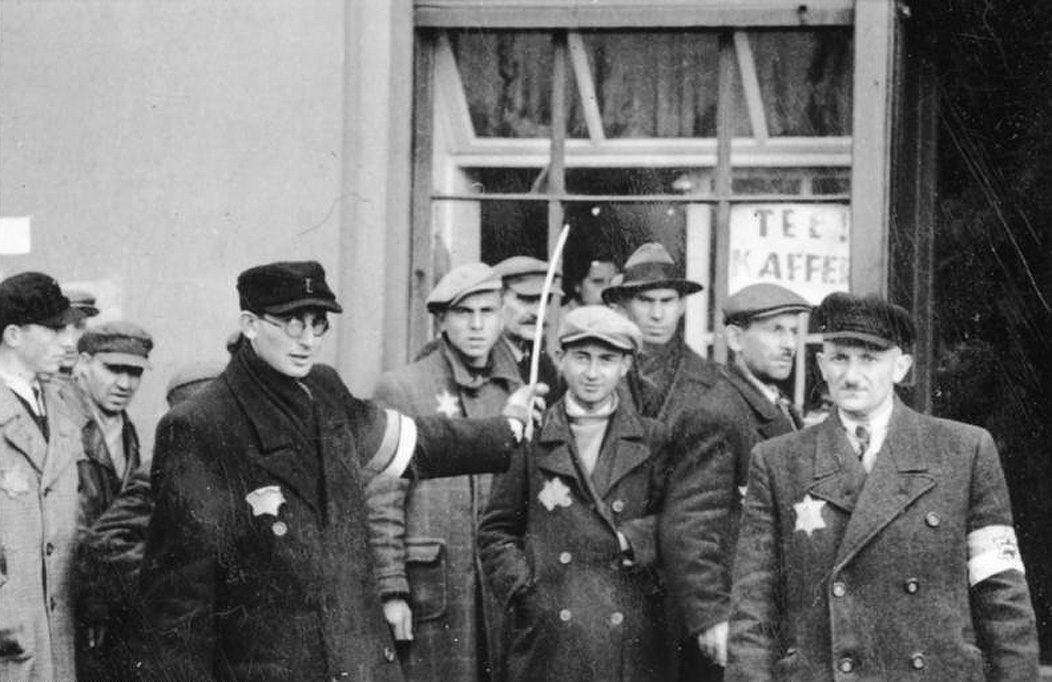
[Above: Jewish policemen in Wegrow, Poland.]
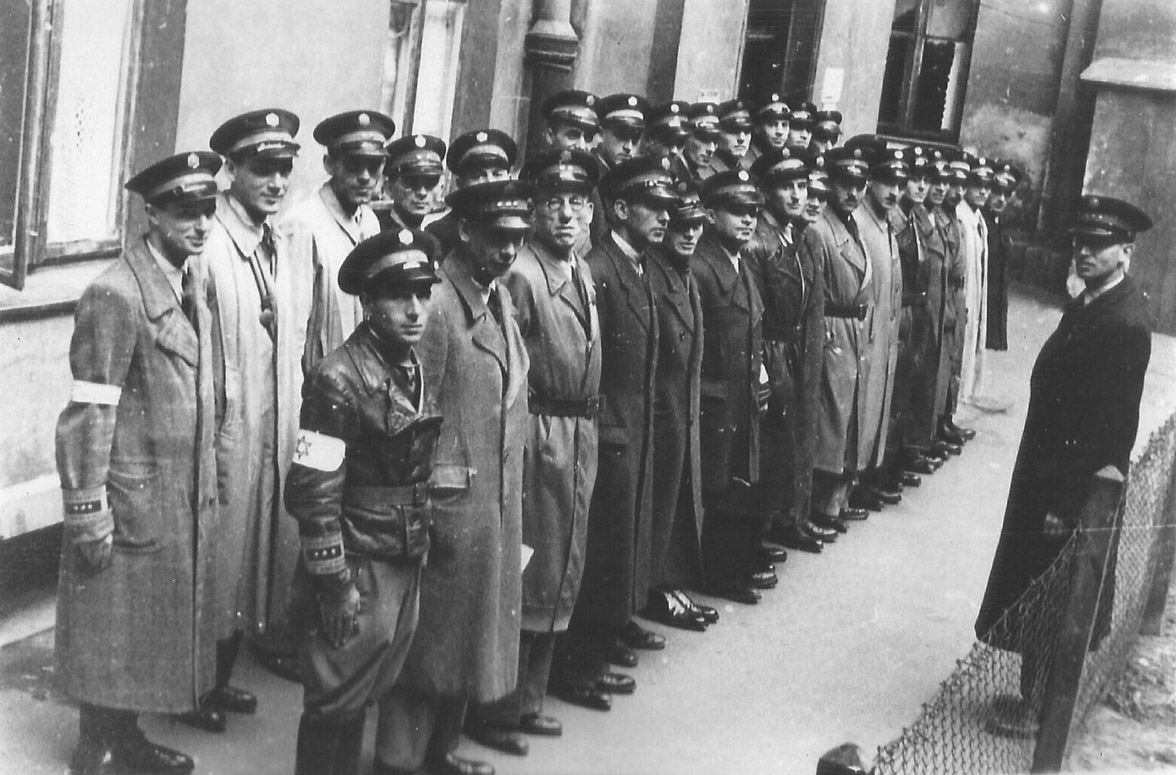
[Above: Jewish policemen at attention.]
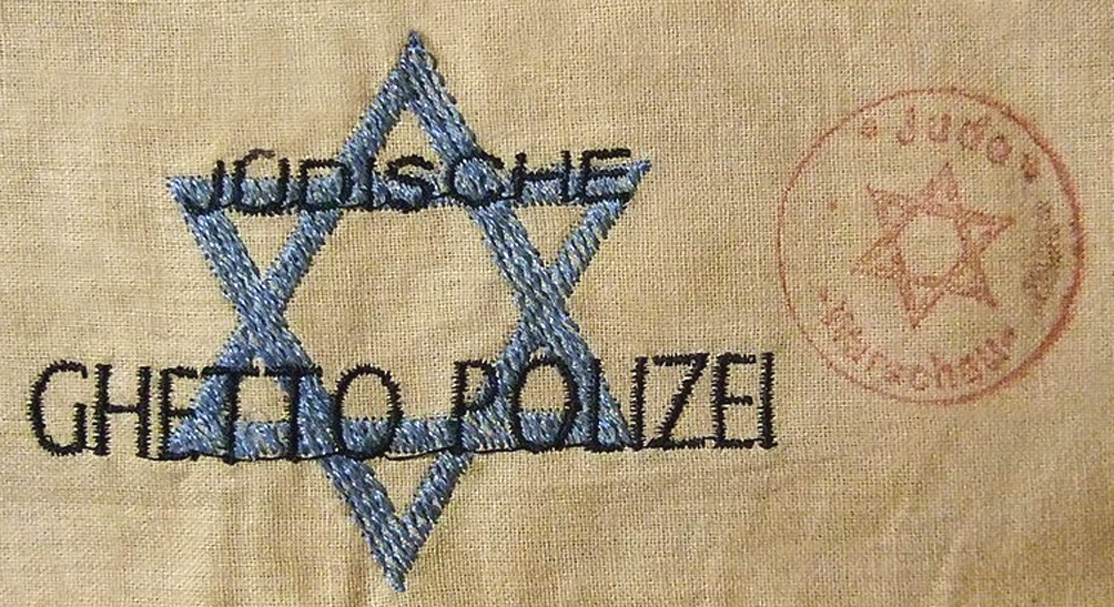
[Above: Armband worn by the Jewish Ghetto Police, Warsaw Ghetto, early 1940s. They were allowed to police themselves and were even ruled by a 'Jewish Council of Elders'.]
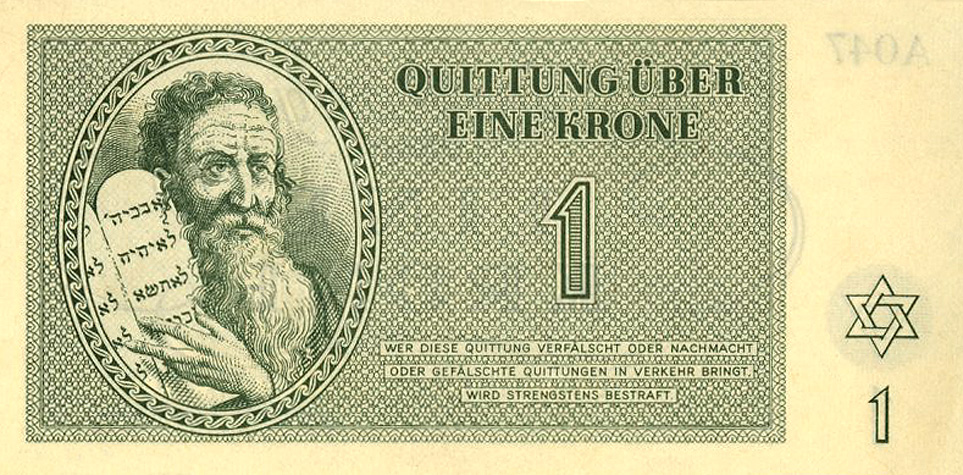
[Above: Many people are surprised to learn that Jews in Litzmannstadt ghetto (and elsewhere) even had their own money and postage stamps issued to them. Below are a few more examples.]
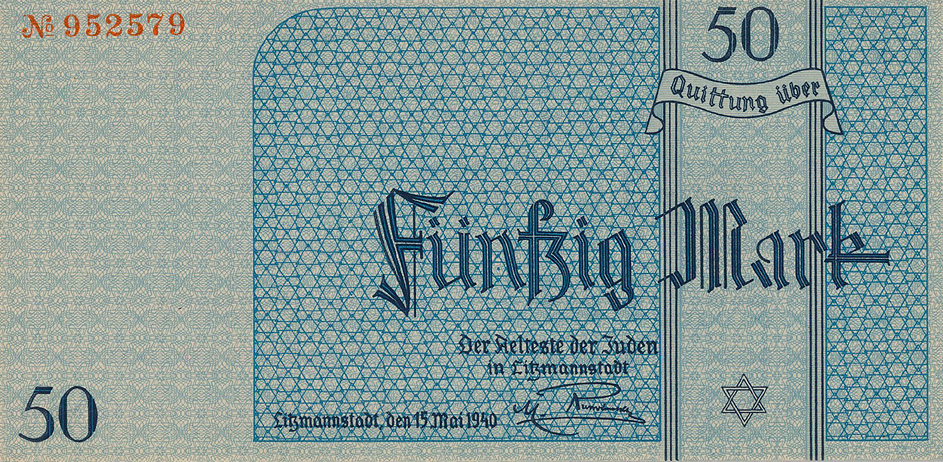
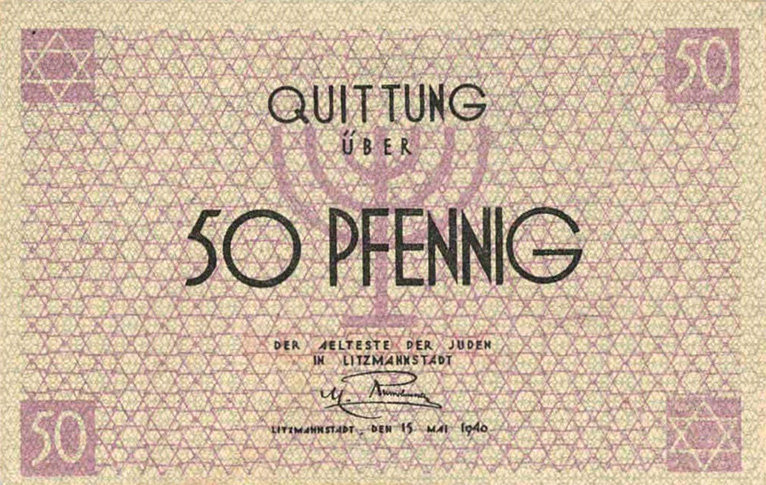
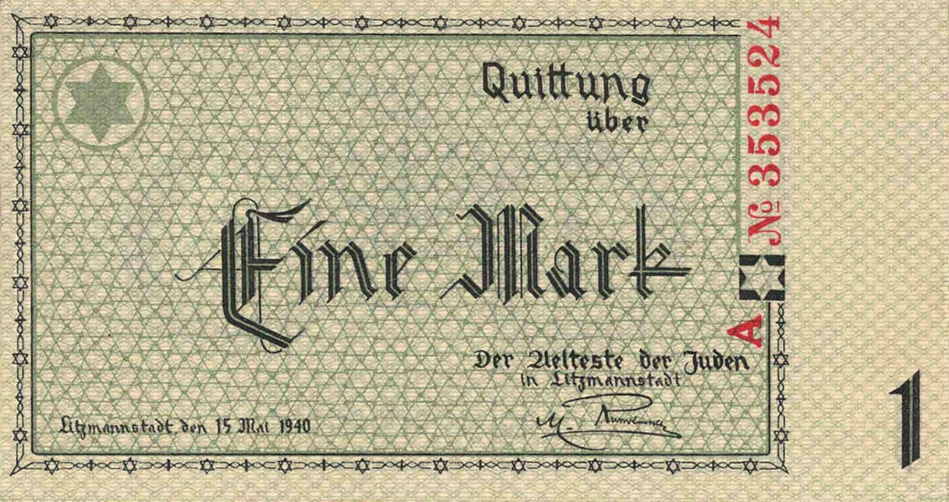

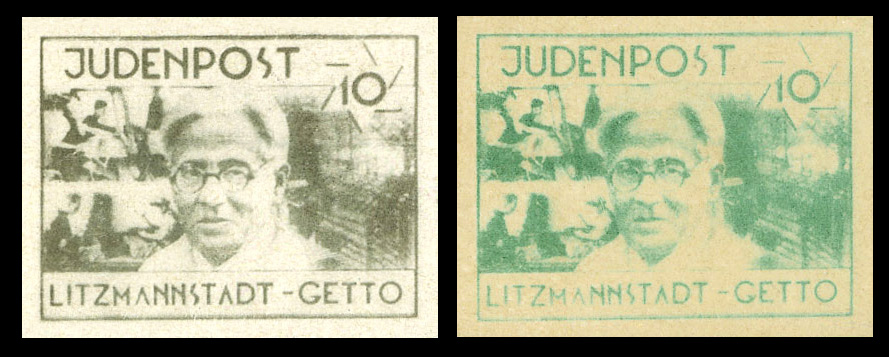
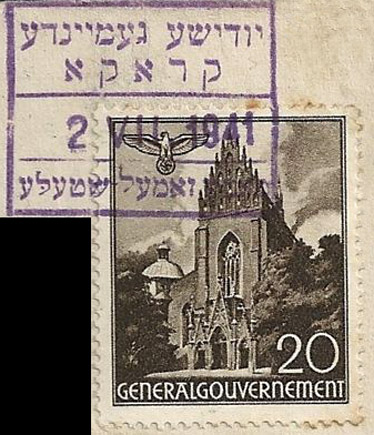
[Above: A postage stamp from German occupied Poland (General Government) from 1941 showing a cancel in Hebrew from the Jewish community in Krakow.]
